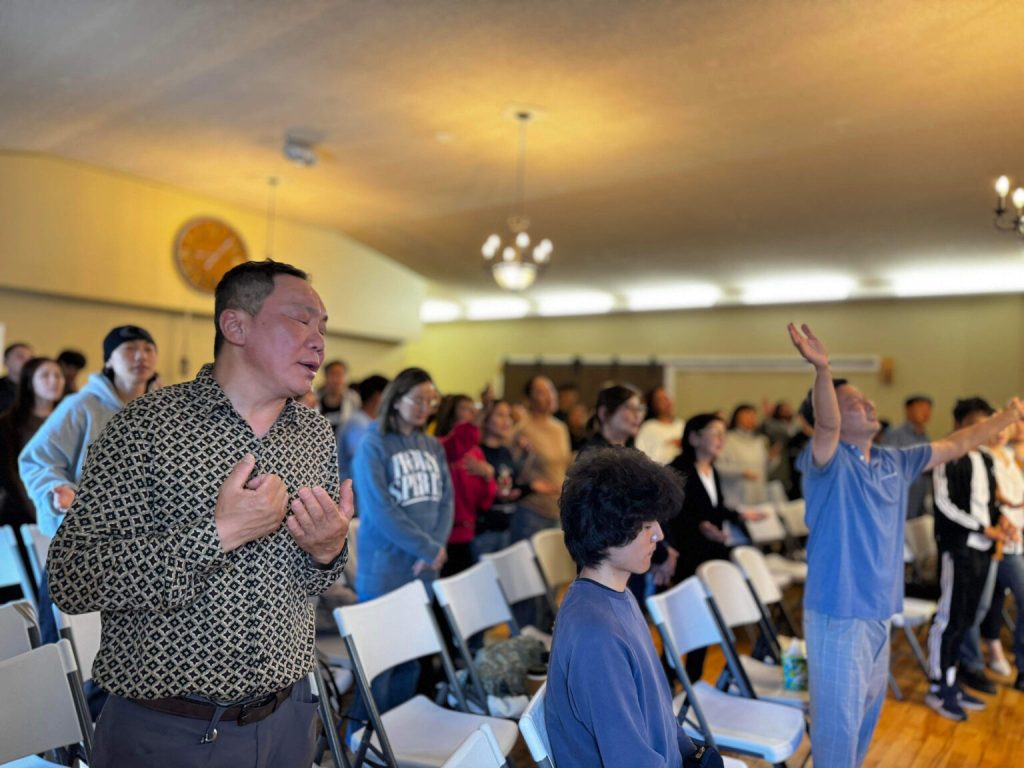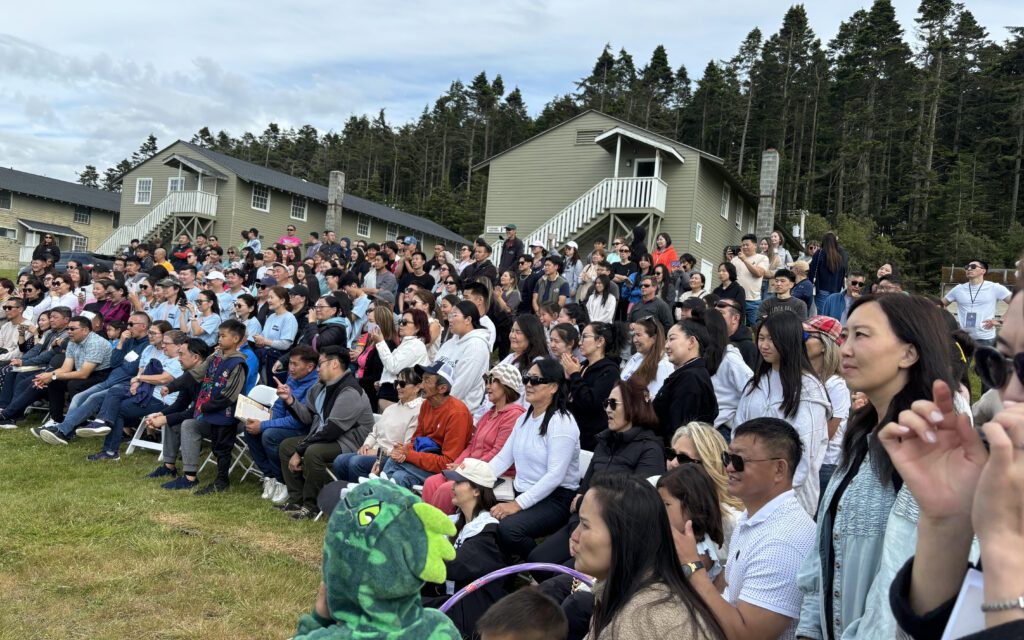ASHON ISLAND, Wash. – “Now all Mongolians know a church exists here in Seattle.”
These words by Ankbayar Jigjid, pastor of Eternal Joy Mongolian Christian Church in Seattle, as translated by his wife Badnaa Onkh for Baptist Press, describe one effect of the late June annual meeting of the North American Mongolian Pastor’s Network (NAMPA).

Mongolian Christians came from across the U.S. to worship, study and refreshment. Photo courtesy of Baptist Press.
Jigjid had invited the 20 Christian churches throughout the United States and Canada that worship in a Mongolian context – six of which affiliate with Southern Baptists – to Vashon Island in Puget Sound for the annual meeting.
About 450 men, women, teens and children arrived, some in colorful Mongolian attire, for four days of worship, study, fellowship, fun and information, under a theme of “Come, you will see” from John 1:39.
“There were many memorable moments in the recent annual conference,” Kevin Borgijin told Baptist Press. He pastors Maranatha Mongolian Mission Church in Greenwood Village, a south Denver suburb. Maranatha, started in 2002, is the oldest Southern Baptist church that worships in a Mongolian context.
“We had small group workshops, five one day and five different workshops the next, such as one based on the book of John, where Jesus said, ‘I am the Bread of Life,’” Borgijin continued. “We had pastors’ meeting, pastors’ wives’ meeting, youth group and English-speaking meeting, and children also, all separate.”
Most noticeable to him, the Colorado pastor said, was the growing number of “young people participating in the conference. We need to work with them more closely to guide them and equip them in Christ.”
Maranatha was planted by a Korean who had served in Mongolia as a Presbyterian missionary. Even today the church is housed in Cherry Creek Presbyterian Church, though Maranatha affiliated with Southern Baptists in 2014.
When Mojic Baldandorj came from Mongolia as the church’s pastor, “He kind of revived the church and took the church under Southern Baptists,” said Borgijin, who became pastor in 2020, when Baldandorj was called to pastor the Oakland, Calif., First Mongolian Christian [Southern Baptist] Church.
California lists four Mongolian churches, in San Francisco, Oakland, Daly City/Concord and Sacramento.
Colorado counts just Maranatha. Washington state reports just Eternal Joy Mongolian Mission Church, but because five families attend who live in Bellevue, east of Interstate 5, the mother church is planting a new church in Bellevue. Already the pastor leads a weekly home Bible study there.

Ankbayar Jigjid (left), pastor of Eternal Joy Mongolian Christian Church in Seattle; his wife Badnaa Onkh; Kevin Borgijin, pastor of Maranatha Mongolian Mission Church in Greenwood Village (far right), and his wife. Photo courtesy of the Baptist Press.
There was a Southern Baptist Mongolian church in the Chicago, but it has since disbanded. The president of the North American Mongolian Pastor’s Network – B. Balkhuyag, pastor of New Future Mongolian Church of the Nazarene – is in Norridge/Lombard, Ill., a Chicago suburb.
The Mongolian network includes Baptist, Christian Missionary Alliance, non-denominational, Pentecostal and Presbyterian churches. All Mongolian evangelicals are invited. It’s estimated the largest number of Mongolians live in Los Angeles, mostly in Koreatown. Other large concentrations live in Washington D.C., Chicago, Seattle and the San Francisco Bay Area.
Though NAMPA has a president, it is as yet an informal organization, Borgijin said. The entire network meets every three years. The two following years are regional events: one in the East; the other in the West.
The Network anticipates formalizing within the next year or two. Already there are quarterly Zoom meetings.
“There aren’t a lot of Mongolian Christians, so it’s always better that we organize events like the annual conference to help smaller churches in far-reaching areas of the U.S.,” the Colorado pastor continued. “Churches in the Mongolian community are growing and people are accepting Christ.”

Photo courtesy of the Baptist Press.
Maranatha baptized six people last year and two so far this year, Borgijin said. Sunday worship services draw 50 or more people, and up to 80 for special days such as Easter and Christmas.
“Maranatha Mongolian Mission Church recognizes the utmost importance of being part of the Mongolian Christian community’s fellowship for several compelling reasons,” the pastor continued. “Firstly, belonging to a community of believers provides spiritual support and accountability, fostering growth in faith and discipleship.”
Also, sharing resources, both spiritual and practical.
“Lastly, participating in the broader Mongolian Christian community helps maintain cultural identity and heritage within the context of faith, fostering a sense of belonging and unity among believers,” Borgijin continued. “Therefore, for Maranatha Mongolian Mission Church, active participation in the Mongolian Christian community’s fellowship is not just beneficial but essential for its spiritual health, growth, and mission.”
About 60 attend Sunday morning worship at Eternal Joy Mongolian Christian [Southern Baptist] Church in Seattle, Pastor Jigjid said. Six were baptized last year.
Jigjid and his wife Badnaa immigrated from Mongolia in 2015 to work with university students in Los Angeles. Two years later they moved to Seattle to start a church at the request of people they’d met who said there was no Mongolian church in the greater Puget Sound area.
“From that time on, God himself continued to work,” Jigjid said. “I spent my time focusing on spreading the Gospel, making disciples, and preparing God’s faithful leaders. God was raising faithful, spiritual, God-seeking believers.”
What started in their home now meets in the smaller sanctuary at Epic Life [Southern Baptist] Church in Seattle, at the same time the multi-cultural congregation meets in the larger worship center.
“Our church is praying for a small church building of our own within five years,” Badnaa said. “We celebrated our fifth anniversary for two hours at the national conference.”
In Mongolian churches everyone participates in everything, the pastor’s wife said. No one comes to Sunday worship only. The Eternal Joy congregation prepared all the meals for four days for the nearly 450 people who attended NAMPA on Vashon Island, accessible by ferry.
“He [Pastor Jigjid] wants to thank all the churches who supported the Mongolian conference and to thank our church people,” Badnaa said. “Even though they are working long hours, for two weeks they prepared. They cooked for 400 people and picked people up from the airport.
“It was really hard work for them, four to five hours a day after their work,” the pastor’s wife continued. “They did a great job. It was a great ministry for the Mongolian people.”
Ministry among Mongolian people dates to soon after the fall of the Berlin Wall in November 1989. By January 1990, Christian missionaries had arrived in the land that shares a border with Russia.
Badnaa traces her conversion to a friend who attended English as a Second language classes led by a missionary. Her husband, to a friend who invited him to church. Borgijid in Colorado to a Navigators discipleship missionary who was a Southern Baptist.
“Give thanks to God. He is truly moving in the Mongolian church,” Borgijid said. “Our church has been growing. … We’ve been blessed with a lot more young people and have started English Ministry.”
This article was originally written by Karen L. Willoughby and published to the Baptist Press.





